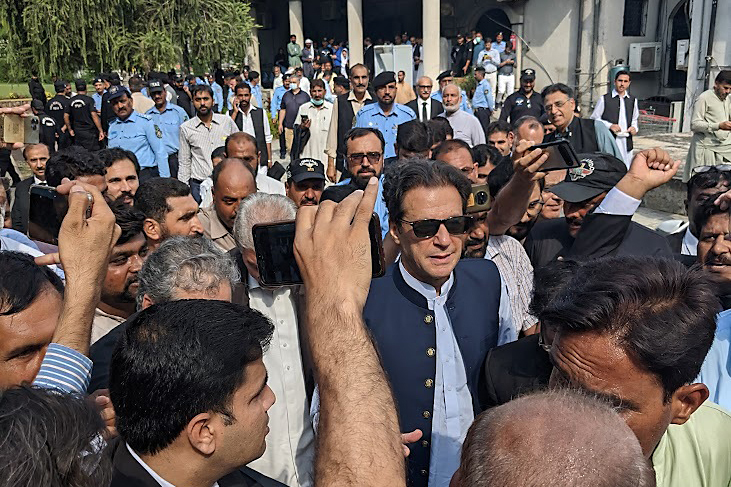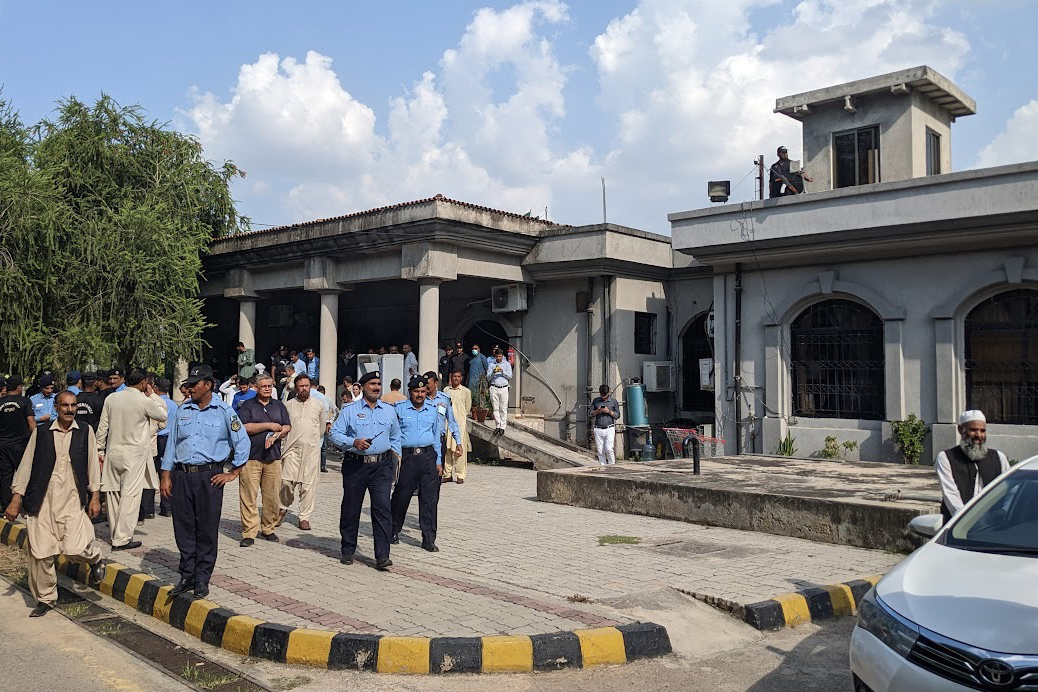
Islamabad, Pakistan – Former Pakistan Prime Minister Imran Khan has been given another chance by the Islamabad High Court to submit a “supplementary” response regarding a contempt of court case initiated against him over remarks made about a judge.
The five-member bench of the court, led by Chief Justice Athar Minallah, heard Khan’s case on Wednesday.
The court expressed disappointment at an earlier response to the allegations submitted by Khan and said it had hoped to conclude the proceedings on Wednesday but could not do so due to the reply that was submitted.
After nearly an hour-long hearing, the court was adjourned until September 8 and an order was issued terming Khan’s submission as “unsatisfactory”. Khan, who appeared in court in person, and his legal team were given a further seven days to resubmit their response.

Khan’s contempt of court case was initiated after a speech he gave on August 20, where he threatened to file a court complaint against senior police officials following the arrest of his close aide, Shahbaz Gill earlier this month.
Khan also singled out Judge Zeba Chaudhry who, in a separate development, had approved the two-day detention of Gill after he was accused of inciting a mutiny in Pakistan’s powerful military. Gill faces sedition charges arising from his alleged comments.
‘A mistake was made’
There was a heavy police presence at the High Court on Wednesday, and only people with prior permission were allowed entry to the courtroom. Khan – chairman of the Pakistan Tehreek-e-Insaf (PTI) – appeared alongside other party leaders approximately 10 minutes before the hearing was scheduled to start at 2.30pm local time (19:30 GMT on Tuesday).
Looking confident and relaxed, Khan sat behind his team of lawyers and closely followed the proceedings.
Beginning the hearing, Chief Justice Athar Minallah expressed disappointment at the response submitted by Khan on Tuesday.

“The response that was submitted was not of the stature of a political leader like Khan,” the chief justice said.
“There should be realisation that a mistake was made,” he continued. “Time has passed and words that have been said cannot be taken back,” he added.
Khan’s lawyer, Hamid Khan, who is not related to the former prime minister, requested that the court provide another opportunity for his client to submit a reply. His client, he added, had no intention to make offensive remarks about the judge.
On Tuesday, Khan submitted a reply to the High Court expressing his “willingness to take back his words” regarding Judge Chaudhry if they were “regarded as inappropriate”.
Khan also requested that the court dispose of the contempt case against him, and called on the court to consider his speech “in context of his intention”, which was not meant to threaten a judicial officer or bring the administration of law into disrepute.
Khan’s legal woes
Following the toppling of his government in April, Khan has held numerous large rallies during which he has heavily criticised political opponents, state institutions, the security forces, and so-called “neutrals” – a commonly-used euphemism for Pakistan’s powerful military establishment.
But the cricket star-turned-politician has faced mounting legal challenges after his August 20 speech criticising the police and the judge.
As well as contempt of court, other cases have been filed against Khan, including one under the country’s strict anti-terrorism laws for “threatening” senior police officials and a judge. He has also been charged with unlawful assembly.
Pakistan’s state media regulator also placed a ban on live broadcasts of Khan’s speeches, calling them a “violation of Article 19 of the Constitution”.
The Pakistan Electronic Media Regulatory Authority (PEMRA) ruled that only Khan’s “recorded” words were permitted to be broadcast as an “effective delay mechanism” to ensure editorial control.
However, events over the last few days have given Khan some relief. Firstly, he was issued interim bail by the anti-terrorism court in Islamabad until September 1.
That was followed by bail issued for the unlawful assembly charge.
Then on Monday, the High Court suspended the ban on Khan’s live broadcasts, ruling that the state’s media regulator had “exceeded its authority” in banning his live speeches.
Chief Justice Minallah also directed the PEMRA to nominate an official to appear before the court and justify the issuance of the live broadcast prohibition order against Khan.







